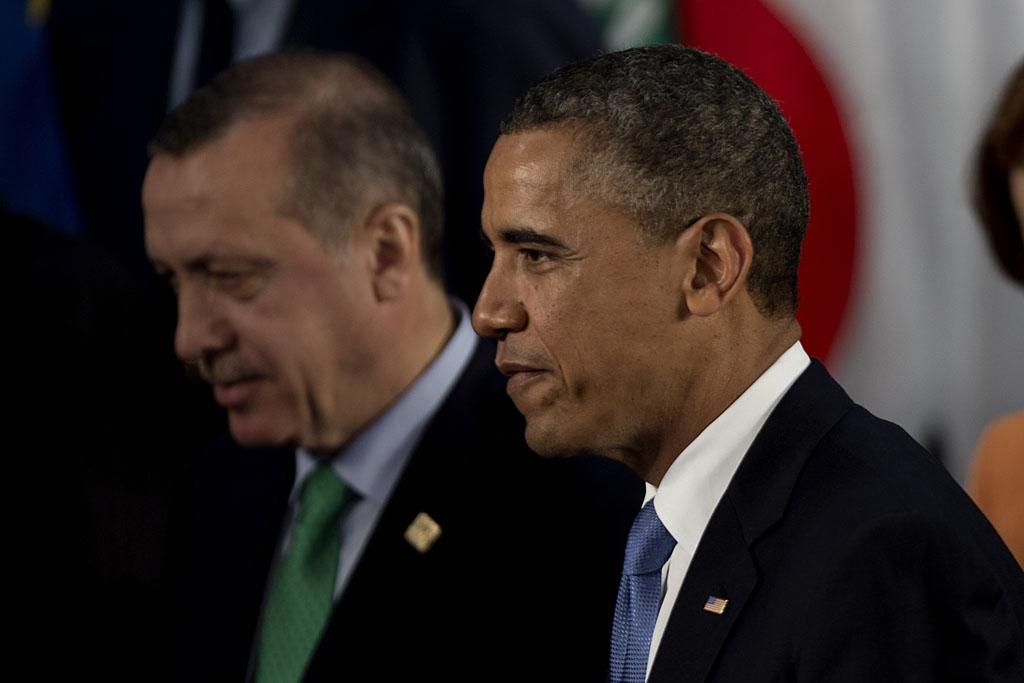Obama plays down mounting controversies
US President Barack Obama (R) and Turkish President Recep Tayyip Erdogan (L) leave after the family picture of the G20 Summit of Heads of State and Government in Los Cabos, Baja California, Mexico on June 18, 2012.
Mounting scandals dominated the news conference President Barack Obama held with Turkish Prime Minister Recep Tayyip Erdogan at the White House on Thursday.
Although they wanted to focus on discussing Syria, Obama was sidelined by questions about the scandals involving the US tax agency's alleged targeting of conservative groups and a Justice Department investigation that led to phone records from the Associated Press being seized.
The president urged Congress to allocate more funds to strengthen security at US embassies and pledged to seek a balance between national security and protecting freedom of the press.
He also vowed to work with Turkey to increase pressure on Syrian President Bashar al-Assad, stressing the importance of humanitarian and non-lethal aid for the opposition.
"We’re going to keep increasing the pressure on the Assad regime and working with the Syrian opposition," Obama said.
Nevertheless, Obama seemed reluctant to put forward any unilateral plan of action, saying he would work with Turkey and the international community on the next steps.
"We have seen evidence of the use of chemical weapons inside of Syria," Obama acknowledged, saying that that did not diminish the tens of thousands who have already died in the conflict. The latest UN estimates put the number at 80,000.
"What I've said is the use of chemical weapons is something the civilized world has recognized should be out of bounds," Obama said.
Last week, Erdogan told NBC that the "red line" of chemical weapon use had been crossed a "long time ago." He said he was sure Assad "has used chemical weapons and missiles" against his own people.
Obama said on Thursday, "We both agree that Assad needs to go."
He praised Turkey for its "extraordinary generosity" in housing hundreds of thousands of Syrian refugees, and credited Erdogan with being at the "forefront" of pushing for the transition of power in Syria.
Erdogan last visited the United States in December 2009. The Turkish press has billed this trip as "historic," according to the Council on Foreign Relations.
The conflict in neighboring Syria is especially important to Turkey, which is sheltering an estimated 325 to 450 thousand Syrian refugees. Erdogan's visit also comes days after two car bombs killed dozens in the Turkish city of Reyhanli, the deadliest terrorist attack in years.
Among the measures Turkey wants is a no-fly zone in Syria. The Obama administration remains reluctant to take such action.
Erdogan will have lunch with Vice President Joe Biden and Secretary of State John Kerry. He is also expected to attend a working dinner with Obama.
More from GlobalPost: UN General Assembly condemns Assad's regime as death toll tops 80,000
On Wednesday, the United Nations General Assembly passed a resolution condemning Assad's regime.
"At least 80,000 have perished since the start of the hostilities, with most of those casualties believed to be civilians," General Assembly President Vuk Jeremic said ahead of the vote.
Earlier this week, Obama discussed Syria with British Prime Minister David Cameron. During a joint press conference, both leaders stressed the need to continue to provide humanitarian and non-lethal support to the Syrian opposition while investigating evidence of the use of chemical weapons.
The United States and Russia agreed earlier this month to arrange an international conference that would bring the Syrian opposition and representatives from Assad's regime to the table.
However, hopes for negotiation are fading as the violence in Syria grows increasingly brutal.
The New York Times noted that reports of a massacre in Syria earlier this month have "revealed new depths of depravity and made the prospect of stitching the country back together appear increasingly difficult."
"That mass killing this month was one in a series of recent sectarian-tinged attacks that Syrians on both sides have seized on to demonize each other. Government and rebel fighters have filmed themselves committing atrocities for the world to see," The Times reported.
More from GlobalPost: Obama, Cameron hold talks on Syria, EU, G8
The story you just read is accessible and free to all because thousands of listeners and readers contribute to our nonprofit newsroom. We go deep to bring you the human-centered international reporting that you know you can trust. To do this work and to do it well, we rely on the support of our listeners. If you appreciated our coverage this year, if there was a story that made you pause or a song that moved you, would you consider making a gift to sustain our work through 2024 and beyond?
